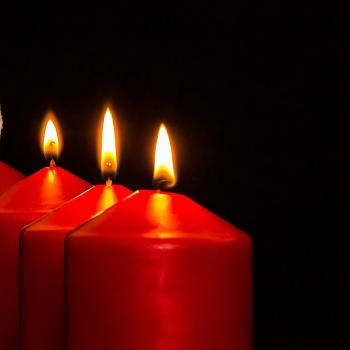Lectionary Reflections
Isaiah 25:6-9
March 31, 2013
No preacher of sound mind would choose a passage of the Hebrew Bible from which to preach on Easter Sunday. After all, this day is about the resurrection of Jesus Christ, risen from the tomb and alive in the world forever. That is why the masses have come in their sartorial best, ready to boom out the hymn, "Christ the Lord is Risen Today," and to glory in the spine-tingling choir rendition of Handel's "Hallelujah Chorus." And then it's off to Easter lunch and the egg hunt, once again mysteriously laid by those Easter rabbits who, on this one day of the year, cease their mammalian existence and become rabi-chickens—or at least some wondrous new breed of platypus. And precisely how they lay chocolate eggs in profusion is an enigma fully worthy of the day of the greatest enigma of all.
Yet, every preacher needs to ask each year that haunting question that lies at the base of all of our attempts to make new this most strange of all days: So what? However we believe, or question, or do not believe the central claim of the Christian faith, that death did not defeat the one we call savior and Lord, what are we now to do with the Monday that is sure to come? Once we have come to terms with the worshipping celebration of the resurrection, however we come to terms with it, once the ties are removed, the pinching high heels are off, the belts loosened from the distended bellies, we find ourselves in the post-resurrection world. We must reflect a bit on what that means for us and for the world.
I have long thought that the old Gospel of Mark got it right about that question. He ends his Gospel (as most scholars affirm) at Mark 16:8, that astonishingly abrupt and bizarre scene where the three women who have gone to the tomb of the dead Jesus have been told clearly by a man clothed in white garments to "tell everyone, especially Peter, that Jesus the dead man is not dead after all but has been raised and goes before them into Galilee." Go, he says, tell everyone! That is Mark 16:7. But in Mark 16:8, we get this: "But the women left the tomb in terror and shock and said nothing to anyone, because they were terrified." Thus ends the Gospel of Mark.
Throughout Mark's telling of the story of Jesus, again and again persons in the gospel are warned not to say anything of what they have seen, but in typical human fashion they blab it all over the countryside. But finally they are told directly to "tell what they have seen" without restraint, yet they are mute and say nothing at all. A moment's thought will see the point. If the women did not tell, then someone must and that someone is you and I. The upshot of the raising of Jesus is that the world is now decisively different, because God has announced that the way of Jesus is the way of God, and all must follow Jesus to Galilee and walk in the way he has walked, living a life of justice and compassion and care for self and the world. And we, all of us who have witnessed this truth must tell it and live each day, on all the Mondays that are to come.
Finally, Easter is not an argument about what happened. Jesus is not the latest undead zombie, who instead of looking for a meal of brains seeks to offer meals to those most in need. The tomb is empty, we say, but discussions of how that may be in line with particle physics or quantum mechanics or evolution or plain common sense is quite beside the point, as engaging and delightful as such debates may be; believe me, in my line of work I have had more than a few of these discussions, more or less heated. But Easter is not the time for argument. It is the time for announcement and action. And perhaps old Isaiah can be helpful to us 21st-century Christian Easter people.
Isaiah 25 has always been hard to place historically. Though it sits in the midst of 8th-century B.C.E. Isaiah, it has a decidedly later historical feel. Indeed, chapters 24-27 are often referred to as later oracles in the midst of the older Isaianic collection. That may be true, but it is placed here canonically among the prophecies of Isaiah, and can be seen as consonant with many of the themes of the 8th-century prophet, however much later they have been composed. In Isaiah 25:6, the prophet paints a glorious portrait of God as divine chef.
YHWH of the armies will make for all peoples on this mountain (Zion/Jerusalem) a feast of rich food and the best wine, rich food filled with fat and wine strained clear.
This is the banquet of YHWH, long promised in the literature of Israel, now depicted by the prophet as the summation of God's ultimate presence with the people.
And which people are being referred to here? Who attends the banquet of YHWH? The answer comes in Isaiah 25:7-8:
YHWH will swallow up on this mountain the pall (shroud), the shroud over all peoples, the sheet spread over all nations. In fact, YHWH will swallow up death forever.





